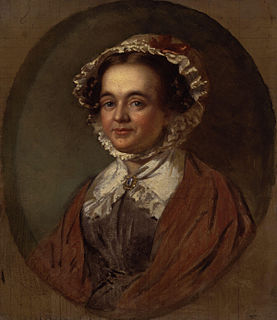A Quote by William Hazlitt
Wonder at the first sight of works of art may be the effect of ignorance and novelty; but real admiration and permanent delight in them are the growth of taste and knowledge.
Related Quotes
The whole difference between a man of genius and other men, it has been said a thousand times, and most truly, is that the first remains in great part a child, seeing with the large eyes of children, in perpetual wonder, not conscious of much knowledge--conscious, rather of infinite ignorance, and yet infinite power; a fountain of eternal admiration, delight, and creative force within him meeting the ocean of visible and governable things around him.
Taste, when once obtained, may be said to be no acquiring faculty, and must remain stationary; but knowledge is of perpetual growth and has infinite demands. Taste, like an artificial canal, winds through a beautiful country, but its borders are confined and its term is limited. Knowledge navigates the ocean, and is perpetually on voyages of discovery.
Surely knowledge of the natural world, knowledge of the human condition, knowledge of the nature and dynamics of society, knowledge of the past so that one may use it in experiencing the present and aspiring to the future--all of these, it would seem reasonable to suppose, are essential to an educated man. To these must be added another--knowledge of the products of our artistic heritage that mark the history of our esthetic wonder and delight.
Ancient art has a specific inner content. At one time, art possessed the same purpose that books do in our day, namely: to preserve and transmit knowledge. In olden days, people did not write books, they incorporated their knowledge into works of art. We would find a great many ideas in the works of ancient art passed down to us, if only we knew how to read them.
Wonder [admiratio astonishment, marvel] is a kind of desire for knowledge. The situation arises when one sees an effect and does not know its cause, or when the cause of the particular effect is one that exceeds his power of understanding. Hence, wonder is a cause of pleasure insofar as there is annexed the hope of attaining understanding of that which one wants to know. ... For desire is especially aroused by the awareness of ignorance, and consequently a man takes the greatest pleasure in those things which he discovers for himself or learns from the ground up.
The European who comes to America plunges into the virgin forest with wonder and delight; while the American who goes to Europe finds his greatest pleasure, at first, in hunting up the memorials of the past. Each is in quest of novelty, and is burning with the desire to gaze at objects of which he has often read.



































